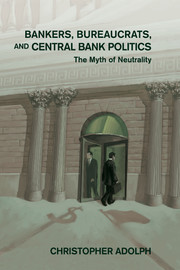Book contents
- Frontmatter
- Contents
- List of figures
- List of tables
- List of boxes
- Abbreviations
- Acknowledgements
- 1 Agents, institutions, and the political economy of performance
- 2 Career theories of monetary policy
- 3 Central banker careers and inflation in industrial democracies
- 4 Careers and the monetary policy process: Three mechanism tests
- 5 Careers and inflation in developing countries
- 6 How central bankers use their independence
- 7 Partisan governments, labor unions, and monetary policy
- 8 The politics of central banker appointment
- 9 The politics of central banker tenure
- 10 Conclusion: The dilemma of discretion
- References and Author index
- Subject index
- About the type, figures, and data
- Other Books in the Series
9 - The politics of central banker tenure
Published online by Cambridge University Press: 05 April 2013
- Frontmatter
- Contents
- List of figures
- List of tables
- List of boxes
- Abbreviations
- Acknowledgements
- 1 Agents, institutions, and the political economy of performance
- 2 Career theories of monetary policy
- 3 Central banker careers and inflation in industrial democracies
- 4 Careers and the monetary policy process: Three mechanism tests
- 5 Careers and inflation in developing countries
- 6 How central bankers use their independence
- 7 Partisan governments, labor unions, and monetary policy
- 8 The politics of central banker appointment
- 9 The politics of central banker tenure
- 10 Conclusion: The dilemma of discretion
- References and Author index
- Subject index
- About the type, figures, and data
- Other Books in the Series
Summary
Because it isn't maybe as simple as bribery, campaign contributions, and that kind of thing. I think that we've had twenty-five years of the Goldman Sachses of the world ruling the world, and the people like Tim Geithner, when they leave office, the way they make their living … is to go to work for a financial institution for huge sums of money; that people have trouble with getting their minds around the world where that's not the way the world works, and there is maybe a slight quickness to believe the world can't function without Goldman Sachs.
MICHAEL LEWISTHE OVERLOOKED EVIDENCE that central banker conservatism affects monetary policy demonstrates that a narrow-minded focus on institutional guarantees of autonomy has crowded out attention to other facets of monetary politics. When distinct or even potentially opposing concepts are gathered under the umbrella of central bank independence, we end up with confused explanations and misguided policy. In this chapter, we turn from central bank independence and central bankers' conservatism to consider two other concepts, central banker turnover and central bank accountability, which have too often been blended with independence. As with conservatism and independence, a sharper distinction between turnover and accountability reveals that politics play a larger than expected role in monetary policy.
- Type
- Chapter
- Information
- Bankers, Bureaucrats, and Central Bank PoliticsThe Myth of Neutrality, pp. 280 - 303Publisher: Cambridge University PressPrint publication year: 2013

